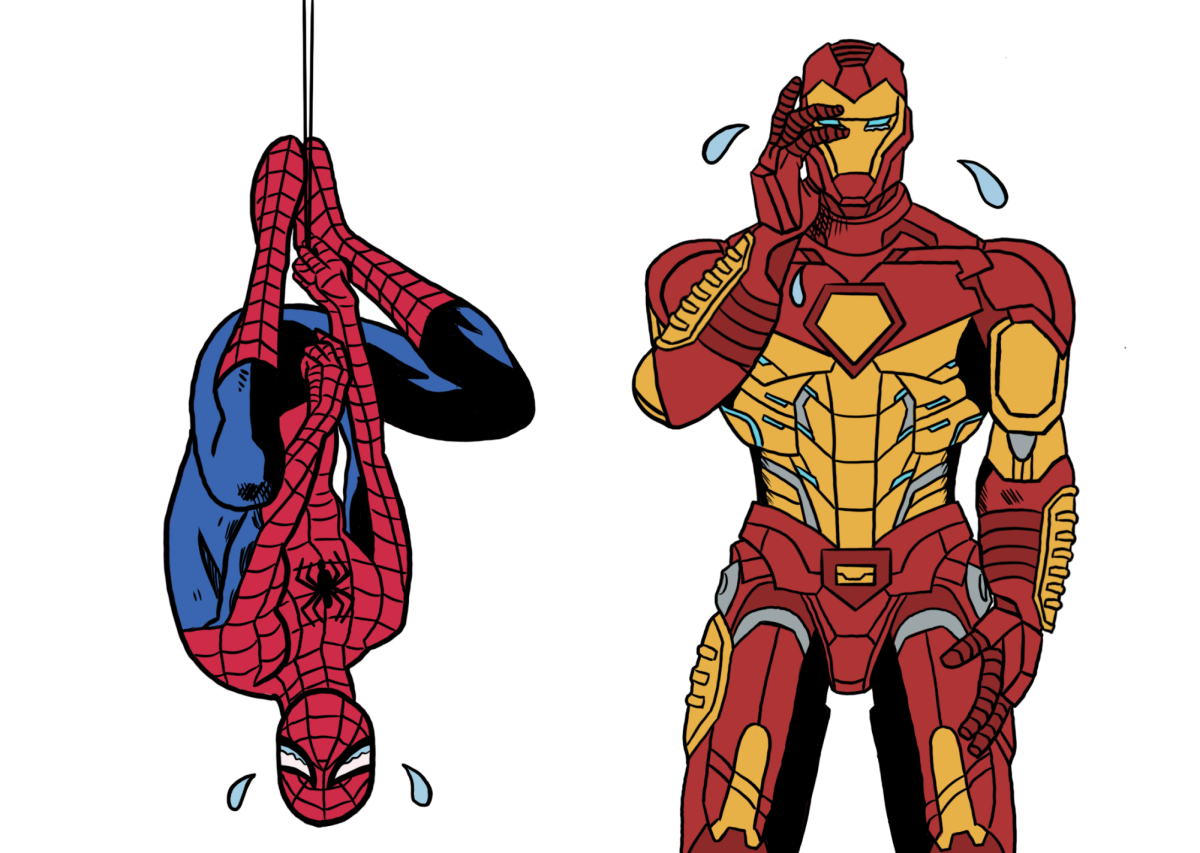Eyes drag away from the theater screen to viewers’ phones, as passionless CGI battles project overhead. Jokes are met not by the boisterous cackling of audiences, but by an agonizing silence. Somewhere in the room, a baby begins to cry. An excruciating sense of boredom consumes the crowd.
Marvel Studios’ latest film, “The Marvels,” is a far cry from the franchise’s previous hits. The action isn’t as captivating, the acting isn’t as engaging and even the franchise’s main leverage — popularity — is gone, with the film reaching an all-time series box office low of $199.7 million worldwide, according to Variety.
Since the franchise’s inception in 2008’s “Iron Man”, popularity for Marvel Studios has boomed. So far, the franchise has accrued $29.8 billion at the box office, becoming the most commercially successful movie series of all time according to Movie Burner Entertainment.
However, the Infinity Saga’s end has seen the franchise’s success diminish considerably, both critically and commercially. So what’s changed?
Peter Canavese, a screenwriter and film reviewer for the Palo Alto Weekly, credits the success of the original movies with creating a loyal fanbase.
“They’ve had successes,” Canavese said. “In some ways, they [Marvel Studios] were in … a ‘can’t lose’ position because they had established all this goodwill.”
Junior Kali Hendershot, president of Palo Alto High School’s film club, says she believes that the growing disinterest in the franchise is due to the change in marketing strategies, with the influx of new content overwhelming compared to previous years. Marvel’s biggest issue isn’t quality, but overexposure — a concept dubbed “superhero fatigue” by individuals who expect nothing less than engaging, good-quality blockbuster content.
“They [Marvel Studios] would … wait an entire year and build suspense, and then they would release one [movie],” Hendershot said. “It was just a great marketing campaign on their behalf. Now, there’s so much content being spewed out of Marvel I think it kind of muddies their whole brand.”
However, Hendershot says she believes that while many fans may not agree with the path Marvel Studios is pursuing, the movies themselves are still well-made and enjoyable.
“I don’t think that [the increased number of releases] detracts from the quality,” Hendershot said. “Not everything is going to be a hit, but I think that there are some hidden gems in there that … deserve some more appreciation.
Canavese, on the other hand, questions whether Kevin Feige, the president of Marvel Studios, is ready to handle the mass production of films and series.
“I think that he [Feige] may have spread himself too thin,” Cavanese said. “He’s juggling with the TV side, and the movie side, and [there are] too many movies per year on top of all that.”
Since the Infinity Saga’s conclusion, Marvel has shifted attention from the global superstars that first drew audiences — Captain America, Thor and Iron Man — opting instead to focus on smaller characters with less name recognition, including ones from minority communities.
While the likes of Shang Chi and Ms. Marvel have considerable popularity in their own right, their draw pales in comparison to previous, more notable characters.
Though Canavese respects the franchise’s introduction of new characters, he simultaneously wonders if the missing ingredient may just be established “star power.”
“The Infinity Saga starred all the top tier heroes, all the core original Avengers,” Canavese said. “They introduced a lot of interesting new characters, but I think without those marquee players … the audience started to slack a little bit.”
In addition, both Hendershot and Canavese believe that lack of variation is one factor contributing to the films’ diminished popularity.
“I really commend them [Marvel Studios] for how risky they’ve gone,” Hendershot said. “They’re still putting their own unique twist on it, but … I think they’re at a point where it’s kind of hard to appeal to a general audience, because after Endgame, how many more epic brawls can you have?”
Canavese agrees, saying that it’s challenging for Marvel to explore new pathways when their entire brand is built off of one “formula” — a pattern already being observed with the 78% drop in ticket sales for “The Marvels”, according to Forbes.
“People are just getting tired of … [the] same old plot structure,” Canavese said. “There’s going to be the hero, and the villain and the big showdown, and at least three big action sequences, and lots of CGI. And there’s only so many variations you can have on that formula.”
Although many have been surprised by the new approach Marvel has taken, Hendershot believes that we should embrace this new change.
“I just really like how they [Marvel] are expressing themselves in ways that are different from the original Avengers,” Hendershot said. “Now, they’re trying to go down a more artistic path.”



